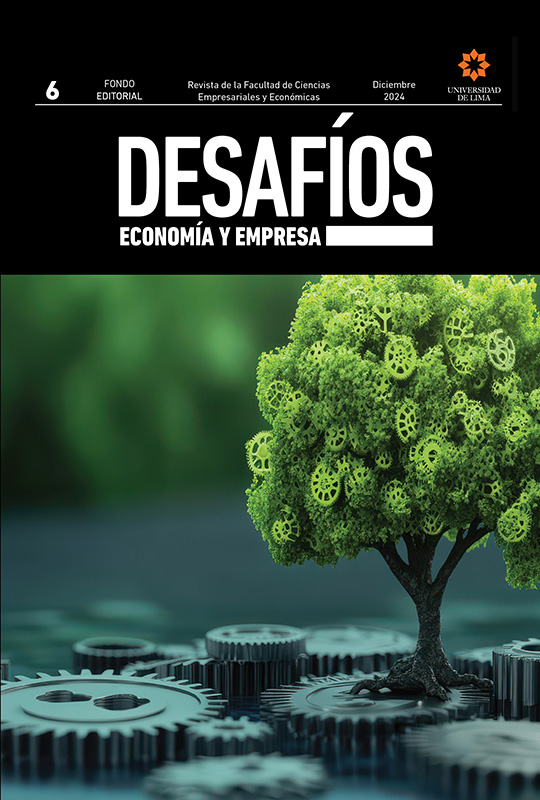Review of the Austrian theory of the business cycle: proposal of teaching and research innovation
DOI:
https://doi.org/10.26439/ddee2025.n6.6927Keywords:
Austrian business cycle theory, financial crisis, credit expansion, teaching and research innovationAbstract
This is a research on Political Economy, Economic History & Institutions and Applied Economics. The focus goes to the problem of business cycles as successive periods of boom and recession suffered by modern economies. This study tries to clarify the causes and effects, according to the review of the Austrian business cycle theory, following the research line based on empirical illustrations. In this way, it is showed this research line and teaching renewal; also, it helps to promote the dialogue with the other economic schools.
Downloads
References
Alonso-Neira, M. A., Bagus, P., & Romero, A. (2013). Una ilustración empírica de la teoría austriaca del ciclo económico: el caso de Estados Unidos, 1988-2010. Investigación Económica, 72(285), 41-74. https://www.scielo.org.mx/scielo.php?script=sci_arttext&pid=S0185-16672013000300002
Alonso-Neira, M.A., Sánchez-Bayón, A., & Castro-Oliva, M. (2023a). An heterodox history of Spanish economy into the Eurozone: Austrian School of Economics analysis of boom and bust. Forum Scientiae Oeconomia, 11(2), 9-41. https://doi.org/10.23762/FSO_VOL11_NO2_1
Alonso-Neira, M. A., Sánchez-Bayón, A., & Castro-Oliva, M. (2023b). Teoría austriaca del ciclo económico aplicada al caso español: del inicio del euro a la gran recesión y su recuperación. Revista de Métodos Cuantitativos para la Economía y la Empresa, 35, 280-310. https://doi.org/10.46661/revmetodoscuanteconempresa.6837
Evans, A. J., Cachanosky, N., & Thorpe, R. (2022). The upper turning point in the Austrian business cycle theory. The Review of Austrian Economics, 35, 89-97. https://link.springer.com/article/10.1007/s11138-019-00497-2
Ferrero, B. (2019). Are structural fluctuations natural or policy-induced? Analyzing Mises’s and Schumpeter’s contributions to business cycle theory. The Quarterly Journal of Austrian Economics, 22(2), 181-217. https://qjae.scholasticahq.com/article/10469.pdf
Garrison R. (2001). Time and money. Routledge.
Hayek, F. A. (2016). La teoría monetaria y el ciclo económico. Unión Editorial.
Holcombe, R. G. (2020). Advanced introduction to the Austrian school of economics (2.a ed.). Edward Elgar Publishing.
Huerta de Soto, J. (2020). Dinero, crédito bancario y ciclos económicos. Unión Editorial.
Jedruchniewicz, A. (2021). Business cycle in agriculture: The Austrian school theory. European Research Studies Journal, 24(2), 690-700.
Keeler, J. P. (2001). Empirical evidence on the Austrian business cycle theory. The Review of Austrian Economics, 14, 331-351.
Lewin, P., & Cachanosky, N. (2019). Re-switching, the average period of production and the Austrian business-cycle theory: A comment on Fratini. The Review of Austrian Economics, 32, 375-382.
Mises, L. (1934). The theory of money and credit. Jonathan Cape.
Nguyen, M. T., & Bui, T. N. (2021). The macroeconomy and the real estate market: Evidence from the global financial crisis and the COVID-19 pandemic crisis. Industrial Engineering & Management Systems, 20(3), 373-383.
Pires de Sousa, P. R., & Moreira, T. B. S. (2019). Efeito do crédito sobre os ciclos económicos e a taxa de inflação via mudanças dos preços relativos: uma análise empírica para a economia brasileira. Razão Contábil e Finanças, 10(1). https://periodicos.uniateneu.edu.br/index.php/razao-contabeis-e-financas/article/view/180
Rallo, J. R. (2019). Una crítica a la teoría monetaria de Mises. Unión Editorial.
Sánchez-Bayón, A. (2020). Una historia epistemológica de los estudios de ciencias jurídicas y económicas. Derecho y Cambio Social, 62, 468-498.
Sánchez-Bayón, A. (2021a). Urgencia de una filosofía económica para la transición digital: Auge y declive del pensamiento anglosajón dominante y una alternativa de bienestar personal. Miscelánea Comillas, 79(155), 521-551.
Sánchez-Bayón, A. (2021b). Giro hermenéutico y revolución copernicana en ciencias económicas: regreso a las raíces y disciplinas duales. Encuentros Multidisciplinares, 23(68), 1-26.
Universidad Rey Juan Carlos. (2023). Grupo de investigación consolidado para el Estudio y seguimiento del ciclo económico de la Universidad Rey Juan Carlos. https://gestion2.urjc.es/pdi/grupos-investigacion/gesce



